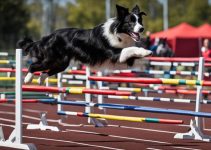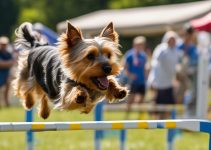Greetings, fellow Rottweiler enthusiasts! As a passionate Rottweiler breeder and trainer, I am thrilled to share my expertise on Rottweiler training. Rottweilers are highly intelligent and trainable dogs that are eager to please. Training them from an early age is crucial to foster positive behavior and ensure they grow into well-adjusted members of your family.
In this comprehensive guide, I will provide you with valuable insights and techniques for Rottweiler training. Whether you are a first-time owner or a seasoned Rottweiler enthusiast, this guide will equip you with the knowledge and tools you need to train your Rottweiler effectively.
From basic obedience commands to addressing unwanted behaviors, such as biting and growling, I will cover it all. We will explore key training milestones for Rottweiler puppies, the importance of early socialization, and the introduction of various training activities.
Throughout this guide, you will find essential tips and techniques that have proven successful in my years of experience. I will also offer guidance on finding reputable Rottweiler training classes and resources, including training videos and guides.
Discover Easy Rottweiler Training
- Rottweiler training requires early socialization and consistency.
- Basic obedience commands are essential for a well-behaved Rottweiler.
- Addressing unwanted behaviors early on can prevent long-term problems.
- Utilize professional trainers and training resources for effective training.
- Training is a rewarding journey that strengthens your bond with your Rottweiler.
Key Milestones: 6–7 Weeks
During the early weeks of a Rottweiler puppy’s life with the breeder, there are several key milestones that contribute to their development and training. These milestones are crucial for their future socialization and behavior.
The breeder plays a vital role in the puppy’s training during this stage. It is important for the breeder to handle the puppies daily, fostering a trusting relationship and promoting positive experiences. Handling the puppies also helps them become more comfortable with human interaction.
Additionally, breeders should encourage visitors to the litter, exposing the puppies to different people and environments. This early exposure helps Rottweilers become more confident and adaptable in various situations.
Socializing with littermates is equally significant. Interacting with their siblings allows puppies to learn valuable social skills, such as bite inhibition and appropriate play behavior. Through play, they also establish their place within the litter’s hierarchy.
- Meeting strangers: Introducing the puppies to unfamiliar individuals helps them become more comfortable around new people later in life. It is an essential part of early socialization.
- Staying with the breeder: It is recommended not to separate a Rottweiler puppy from its littermates before seven weeks of age. This extended stay with the breeder allows for proper social development and ensures that puppies receive sufficient care and attention.
By focusing on these Rottweiler training milestones, breeders can lay the foundation for a well-rounded and socially adjusted Rottweiler. In the next section, we will explore the key milestones for Rottweilers at 8-9 weeks of age.
Key Milestones: 8–9 Weeks
At around 8-9 weeks of age, Rottweiler puppies are ready to achieve new training milestones. This stage is crucial for setting training goals and introducing various important aspects of their development.
Setting Training Goals
During this phase, it is important to establish clear training goals for your Rottweiler. These goals may include teaching basic manners, socializing with strangers, and ensuring proper nail care and grooming. By setting these goals early on, you can lay the foundation for a well-behaved and confident Rottweiler.
Basic Commands
Introducing basic commands is another important milestone at this stage. Teach your Rottweiler simple commands such as “sit,” “stay,” and “come.” These commands are essential for establishing obedience and effective communication.
Potty Training and Leash Training
Potty training is crucial during this stage. Establish a consistent routine and reward your Rottweiler for proper elimination. Additionally, introduce leash training to ensure your puppy learns to walk calmly and comfortably on a leash.
Socializing with Strangers
Socialization with strangers is a vital aspect of your Rottweiler’s development. Expose your puppy to different people, environments, and situations to promote confidence and a friendly demeanor.
Exploring Activities
At this stage, you can begin introducing your Rottweiler to various activities that they excel at. Activities such as agility, herding, swimming, and obedience work can provide mental and physical stimulation, allowing your Rottweiler to thrive.
Remember, consistency, patience, and positive reinforcement are key when training your Rottweiler. Celebrate small victories and provide plenty of love and guidance throughout the process. With these training milestones, your Rottweiler will develop into a well-rounded and obedient companion.

Key Milestones: 4 Months
At around 4 months of age, Rottweilers reach important milestones in their training journey. Here are some key aspects to focus on during this stage:
- Socializing with other dogs: It’s crucial to introduce your Rottweiler puppy to other dogs for proper socialization. This helps them develop appropriate dog-to-dog behavior and become well-rounded pets.
- Enrolling in obedience classes: Consider enrolling your Rottweiler in obedience classes to enhance their training. These classes provide professional guidance and structured learning environments where your puppy can learn and thrive.
- Vaccination requirements: Ensure that your Rottweiler is fully vaccinated before exposing them to other dogs or public spaces. Vaccinations protect your puppy from potentially harmful diseases and ensure their overall well-being.
- Private training: If obedience classes are not feasible or preferred, private training sessions can be a great alternative. Private trainers can offer personalized attention and tailor the training to address specific needs and goals.
- Virtual classes: In today’s digital age, virtual training classes have become increasingly popular. These online sessions provide convenience and flexibility while still allowing your Rottweiler to learn and progress in their training.
Remember, each Rottweiler is unique, and their training journey may vary. It’s essential to adapt these milestones to your puppy’s individual needs and seek guidance from reputable trainers or your breeder if needed.
Rottweilers Training Basics
Training a Rottweiler puppy is a crucial part of their development and helps to build a strong bond between the dog and the owner. Starting at around 7 weeks of age, it’s important to lay the foundation for obedience and socialization. Here are the essential elements of Rottweiler training:
1. Starting Age for Training
Rottweiler training journey can start as early as 7 weeks of age. However, it’s important to keep in mind that their attention span is shorter at this stage, so patience and short training sessions are key.
2. Early Leadership
Establishing early leadership is vital in Rottweiler training. These dogs respond well to confident and consistent leadership. By setting clear boundaries and providing positive reinforcement, you can shape their behavior effectively.
3. Socialization
Proper socialization is crucial for Rottweilers to develop good manners and be comfortable in various environments. Expose them to different people, animals, and experiences from a young age to prevent fear or aggression in adulthood.
4. Treating as Rewards
Rottweilers are highly motivated by rewards, especially treats. Use small, tasty treats as positive reinforcement to encourage desired behaviors during training sessions.
5. Operant Conditioning
Operant conditioning is a highly effective training technique that involves reinforcing desired behaviors and ignoring or redirecting unwanted behaviors. Use positive reinforcement, such as treats and praise, to reward good behavior and discourage negative actions.
6. Charging the Marker
A marker is a sound or signal that immediately follows a desired behavior to let the dog know they have done something right. Begin by “charging” the marker, such as a clicker or a verbal cue like “yes,” by pairing it with rewards consistently so that the dog associates the marker with positive outcomes.
7. Teaching Commands
Teaching essential commands is an integral part of Rottweiler training. Start with basic obedience commands such as “heel” for walking on a leash, “come” for recall, and “down” for lying down on command. Consistency and repetition are key to successfully teaching these commands.
By following these training basics, you can help your Rottweiler grow into a well-behaved and obedient companion. Remember to be patient, consistent, and always reward good behavior. With proper training and socialization, your Rottweiler can become a happy and well-adjusted member of your family.
Common Training Challenges and Solutions
Training a Rottweiler can present various challenges, but with the right techniques and consistency, these challenges can be overcome. Here are some common training challenges that Rottweiler owners may face, along with effective solutions:
Growling and Biting
One challenge that Rottweiler owners may encounter is growling and biting behavior. It is important to address and correct this behavior early on to prevent it from escalating. Through proper discipline techniques, such as positive reinforcement and redirection, you can effectively discourage growling and biting.
In-Home Training
In-home training is highly recommended for Rottweilers as it helps establish a strong bond between the owner and the dog. Training your Rottweiler at home allows for consistent practice and reinforcement of obedience commands. It enables you to address specific behavioral issues in the comfort and familiarity of your own environment.
Potty Training
Potty training is a crucial aspect of Rottweiler training. Using a crate can be an effective method to establish a routine and teach your Rottweiler where and when to eliminate. Consistency, patience, and positive reinforcement are key to successful potty training.
Resource Guarding
Rottweilers may exhibit resource guarding behavior, which involves protecting their belongings such as food, toys, or territory. This behavior can be deterred through proper training methods, including positive reinforcement, desensitization, and counterconditioning. It is important to establish clear boundaries and teach your Rottweiler that sharing resources is desirable.
Obedience Training Methods
When it comes to obedience training, it is essential to use effective and positive training methods. Positive reinforcement, such as treats and praise, can be highly effective in motivating and rewarding desired behaviors. By using consistency and patience, you can teach your Rottweiler basic commands and ensure their obedience.
Benefits of In-Home Training
In-home training is a highly effective and convenient approach for Rottweiler owners to train their dogs in a comfortable and familiar environment. It allows for personalized attention and customized training programs that cater to the specific needs of each dog and owner.
One of the key benefits of in-home dog training is the opportunity for Rottweilers to learn from their owners’ body language. Dogs are highly perceptive creatures and can pick up on subtle cues and signals. By training in-home, Rottweilers can better understand and respond to their owners’ commands and expectations.
Furthermore, in-home training facilitates the development of a strong bond between the dog and the owner. Regular training sessions create a routine that fosters trust, respect, and communication. This bond is crucial for establishing a solid foundation for further training and ensuring a lifelong harmonious relationship.
In-home training also provides a conducive environment for proper interaction and understanding of the dog’s needs. The trainer can observe the Rottweiler’s behavior in their own environment and address any specific issues that may arise. This personalized approach allows for targeted training to address behavioral problems, such as aggression or separation anxiety.
For owners who may have physical limitations or busy schedules, in-home training offers convenience and flexibility. Training sessions can be tailored to the owner’s availability and can be adapted to fit their specific needs and abilities.
In cases where owners require additional support or have more challenging training requirements, trusted board and train programs can be considered. These programs provide intensive training in a controlled environment, where professional trainers work closely with Rottweilers to address specific behavioral issues and provide comprehensive training.
Overall, in-home training is a valuable option for Rottweiler owners seeking a personalized, effective, and stress-free training experience. It allows for better communication, a stronger bond, and a deeper understanding of the dog’s limitations and potential.

Conclusion
Training a Rottweiler is a fulfilling and worthwhile journey that demands patience, consistency, and the use of effective techniques. From the early stages, prioritizing socialization, establishing leadership, and focusing on basic obedience training is crucial for developing a well-behaved Rottweiler. However, it is important to acknowledge that professional trainers can provide invaluable guidance and expertise in navigating the training process.
When undertaking Rottweiler training, it is highly recommended to explore a variety of training resources that offer comprehensive tips, tutorials, and step-by-step guides. These resources can provide valuable insights into effective training methods, ensuring that your Rottweiler learns and responds positively to the training sessions.
By adopting the right approach and dedicating yourself to the training process, Rottweilers can excel in various training endeavors and become well-adjusted family pets. Remember, training is about building a strong bond between you and your Rottweiler, and it is a continuous journey of growth and learning for both you and your furry companion.
FAQ
What are some key training milestones for Rottweiler puppies?
Key training milestones for Rottweiler puppies include early socialization, basic commands, nail care, potty training, leash walking, and introducing the puppy to various activities.
How important is early socialization for Rottweiler puppies?
Early socialization is crucial for Rottweiler puppies as it helps foster positive behavior and ensures proper social development. It includes meeting strangers, experiencing new environments, and interacting with littermates.
What are some training goals for Rottweiler puppies at 8-9 weeks of age?
Training goals at 8-9 weeks of age may include basic manners, socializing with strangers, nail care, grooming, basic commands, potty training, leash training, and introducing activities such as agility and swimming.
When can Rottweilers be introduced to other dogs for socialization?
Rottweilers can be introduced to other dogs for socialization at around 4 months of age, once they are fully vaccinated. It is important to supervise the interactions and ensure appropriate dog-to-dog behavior.
Should I enroll my Rottweiler puppy in obedience classes?
Enrolling your Rottweiler puppy in obedience classes is recommended, but it is essential to wait until the puppy is fully vaccinated. Alternatively, private training, virtual classes, or seeking advice from the breeder can be beneficial.
What are some key training basics for Rottweilers?
Training basics for Rottweilers include establishing early leadership, using treats as rewards, employing operant conditioning techniques, and teaching commands such as heel, come, and down.
How should I address growling and biting in my Rottweiler?
Growling and biting should be addressed using proper discipline techniques. In-home training is recommended to establish a strong dog-owner bond and teach obedience. Consistency and clear boundaries are essential.
What are the benefits of in-home training for Rottweilers?
In-home training allows Rottweilers to learn from their owners’ body language and establishes a strong bond. It also provides the opportunity for proper interaction and understanding of the dog’s needs.
Is professional training for Rottweilers recommended?
Utilizing the expertise of professional trainers can greatly contribute to the success of Rottweiler training, especially in cases where owners are physically unable to train their dogs or if the dog displays aggression.






